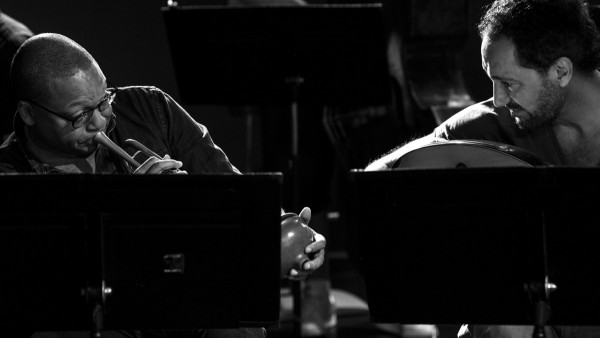Jazz in Marciac, Happy 40th Anniversary
As a New Orleanian, I am a non-French speaking extended family member of France. As a trumpeter, I began studying from the book of Frenchman Jean Baptiste Arban at 6 years old, and still today, strive to play his exercises correctly. I am also honored to be one of the many descendants of the great virtuoso Maurice André whose sparkling playing inspired a world of trumpet players to pursue excellence.
As a jazz musician, I am profoundly grateful for the deep and lasting imprint of French culture and scholarship on the identity of our music. During Word War 1, the French embraced the music of Afro-American musician James Reese Europe, and members of the 369th Infantry “Hellfighters” band from Harlem. This fascination and acceptance of ragtime, the blues, and jazz continued after the war and would eventually culminate in the elevation of New Orleanian jazzman Sidney Bechet to the status of French cultural hero.
Hugh Panassie’, Charles Delaunay and a few other students created the “Hot Clubs of France” which established and promoted the value of jazz all over this country. The Quintet of the Hot Club of France, featured geniuses Stéphane Grappelli and Django Reinhardt, whose virtuosity and deep swing demonstrated that jazz was an international musical language. Charles Delaunay, authored the first jazz discography, and along with Mr. Panassie founded Jazz Hot Magazine. This publication, started in 1935, is still going strong.
The very first Jazz Record Company in the world, Swing Records was established in France and, after the Second World War, the International Festival of Jazz in Paris welcomed the styles of different generations of musicians showcasing jazz as serious art with a meaningful tradition. This was meaningful because jazz was still struggling with the perception that it was a popular fad requiring new tricks like a circus act.
Throughout the 20th century, French classical composers rejected the snobbery and prejudice that was commonplace at that time to express an affinity and deep respect for jazz. The great Maurice Ravel immediately comes to mind with his respect for Ellington, as does Darius Milhaud, who was the greatest influence in the life and work of Dave Brubeck. Milhaud was instrumental in helping shape the young Brubeck into the great musician, composer, ambassador, and champion of human rights that he became.
As we moved into the 1960’s, the American Civil Rights Era, every serious jazz musician pursued a meaningful relationship with French culture and audiences. Many many great albums were made here, from “Dizzy on the French Riviera” in 1962, to “Miles in Antibes” in 1963, to Duke Ellington and Ella Fitzgerald’s live recordings in Juan-les-Pins in 1967. Jazzmen and women knew that France appreciated and embraced our music, and she also afforded some of the freedoms denied us in our own country at that time.
The story of Marciac which began in 1977, is also part of this continuum. Born 40 years ago with American trumpeter Bill Coleman and Jean Louis Guilhaumon and in the furniture shop of Marcel Labarriere, it was a way for people to get together and express their communality and their commonality.
I have been blessed to play here for 26 of those years. From my first year, I always felt an uncommon integrity in this place. Here, we have played with New Orleans masters, a big band of young French Musicians, young musicians from New York, symphonic orchestras, with musicians from Brazil, Pakistan and Iraq, with Pierre Boussaget, Hervé Sellin, the legendary Guy Lafitte, the great tap dancer Jared Grimes and with my soulful septet, the Jazz at Lincoln Center Orchestra and the fantastic musicians up here tonight. Here, we have seen the Chapiteau absolutely silent in mass concentration and have also heard it rock with the intensity of an old time church revival. We have played until all hours of the morning to rapturous applause and stomping and cheering, played in the square while families socialized and shopped, in restaurants, clubs, homes and vineyards. Here, we have played parades down the street at official functions and at parties. Two nights ago, I played with one of our students who attended the college in the 90’s, Emile Parisien. It was a profound experience that took 20 years to enjoy.
For me, it has all been glorious and fortunate. Everyone knows about the romance of this region: the Armangac, the sunflowers, the bright night moon, the winding roads lined with stoic trees and the rustic architecture. Yes, cassoulet, foie gras and Saint Mont wine is wonderful, but the soul of everything is always the people. It is something very powerful and at the same time very delicate. It must be nurtured at all times because this spirit is all that we can truly pass on to the future. Materials decay but the spirit prevails.
20 years ago I wrote a suite dedicated to the festival and this spirit. My feeling was very strong at that time. The passage of years have only deepened that feeling. Integrity is hard to come by, it’s even harder to maintain. We have created something very special here for 40 years. Because it’s a lot easier to let something fall than to pick it up, we must celebrate each anniversary by reaffirming the integrity that this festival represented at birth. Thank you for your kindness through all these years and thank you.
Wynton
We have gotten requests to posts these remarks from the livestream of the Marciac show with Cecile. She and her mother and aunt graciously translated them into French one hour before the show and Cecile delivered them with such grace, sophistication, and calm, as she did the entire show of 9 songs and 8 new arrangements that were just rehearsed two days before.


